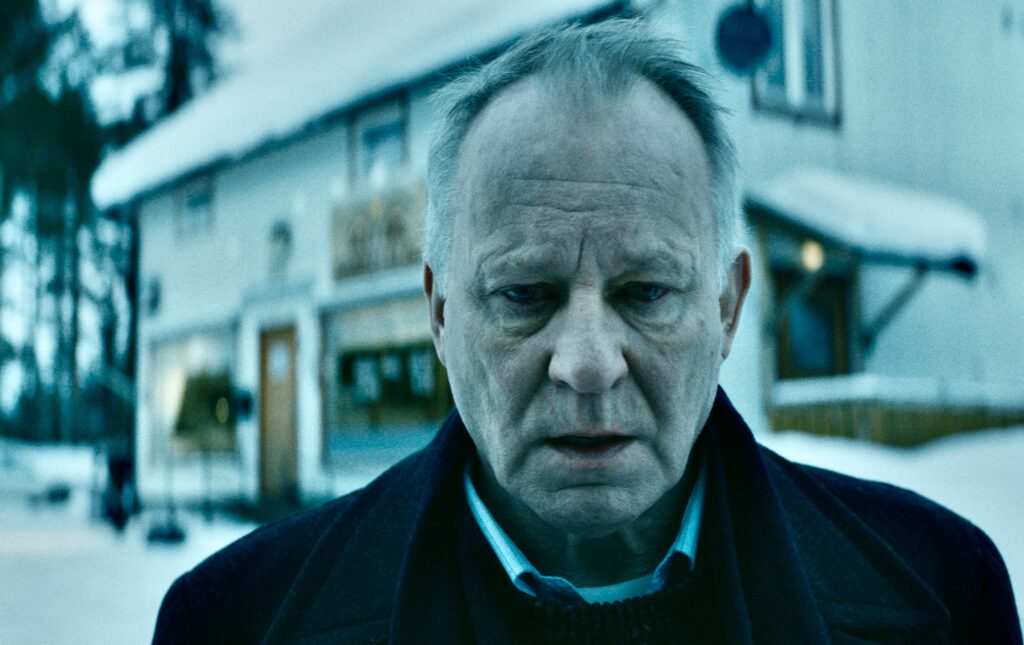
When the title of a film is more vibrant than anything you’ll see on the screen, it’s an issue.
The source material for this meandering and overly sentimental coming-of-age drama is the bestselling novel of the same name by Norwegian author Per Petterson. The focus is on a 67-year-old man named Trond (Stellan Skarsgård, Chernobyl) who relocates to rural Norway, a trip that stirs memories.
There’s a real challenge when adapting a book for the screen if the novel uses a story-within-a-story format. It’s a narrative style that is more interesting to decipher and much easier to absorb when reading. In a film, if not carefully done, it’s a quirky device that can be dissonant.
It’s the turn of the century. Out with 1999, in with 2000. Trond has returned to a snowy mountainous Norwegian forest, not far from the Swedish border. Just being in the vicinity reminds him of the summer of 1948, when he was just 15 (Jon Ranes) and living with his father (Tobias Santelmann, Kon-Tiki) in a rustic cabin. As he faces the new millennium, widowed and alone, vivid bittersweet recollections prove haunting.
Moments of his loving but sometimes testy relationship with his dad come back to him. Jealousy from their mutual and lustful affection for the mother (Danica Curcic) of Trond’s friend Jon (Sjur Vatne Brean) comes to mind. Incidents in Jon’s family, including infidelity and manslaughter, further pique Trond’s remembrances. And then there are flashbacks of him riding stallions.
Petterson’s story, as modified for screen by writer/director Hans Petter Moland (The Beautiful Country), sticks to a “now-and-then” presentation even adding on some tragedies dating back to mid 1940s WWII. In some filmmakers’ hands, the disjointed structure could be alluring. In this case, just as you are warming up to a certain time and situation, it’s gone.
That compounding effect makes Trond’s musings seem distant and unattached. You tend to casually observe his past, not witness it with any intensity. It’s hard to stay deeply involved with the elder Trond’s torment. Harder still to feel any importance in younger Trond’s crises, enigmatic friendships or teen angst.
If an audience is willing to push the weak characterizations aside, they get to glance at gorgeous panoramic vistas filled with majestic forests, verdant fields, babbling creeks and rolling hills. All beautifully framed, perfectly lit and well composed by cinematographer Rasmus Videbæk. Under the guidance of production manager Vigdis Roset, cabins, banks and homes all fairly evoke the present and past. Characters wear clothes that look like they’ve been sweated through under the hot summer sun (costume designer Anne Pedersen). And enchanting music (composer Kaspar Kaae) transports you to Norway and its splendor.
As a director, Hans Petter Moland is far better at making the hinterlands of Scandinavia fetching. Of particular interest is the way he films scenes of high timber being felled, piled up and floated down river. Those moments provide images of country life that are enduring. Moland is far less deft at pulling dynamic performances from his cast. The actors are way too reserved. Everything simmers. Nothing boils over. Pivotal father-son conflict never leads to grievous anger. The wayward leanings of an unfulfilled wife who cheats with a married man and flirts with a teenager don’t lead to substantial erotic overtones. So much potential, so little realized.
Though the story is about the older and younger Trond, Stellan Skarsgård and Jon Ranes do not build characters that merit the attention. More vigorous performances from them might have allowed viewers to overlook the film’s blandness and revel in their acting. Not a chance. Conversely, Tobias Santelmann stands out. He has a face you may think you’ve seen in other movies, even if you haven’t, and he gives the dad a selfish and mysterious persona. Danica Curcic is also fairly engaging, though it feels like she’s holding back.
Trond’s subdued emotional turmoil in 1999 and recollections of 1948 are not strong enough to warrant a film or sustain an audience’s rapt attention. His scenic visions would have been better off as a series of postcards of Norway and Sweden. His mental pictures of friends and family should have been no more than photos assembled in an album. His personal revelations could have been pages torn from a diary and bound into a scrapbook. All of these formats would have been more beguiling than what’s on view.
Trond: “We decide for ourselves when it will hurt.” His incessant melancholia is a buzz kill and not compelling enough to inspire empathy for 122 minutes straight (editors Jens Christian Fodstad and Nicolaj Monberg).
In the end, the few spirited scenes that do include horses can’t make up for the dull sequences that don’t.
Visit NNPA News Wire Film Critic Dwight Brown at DwightBrownInk.com and BlackPressUSA.com.